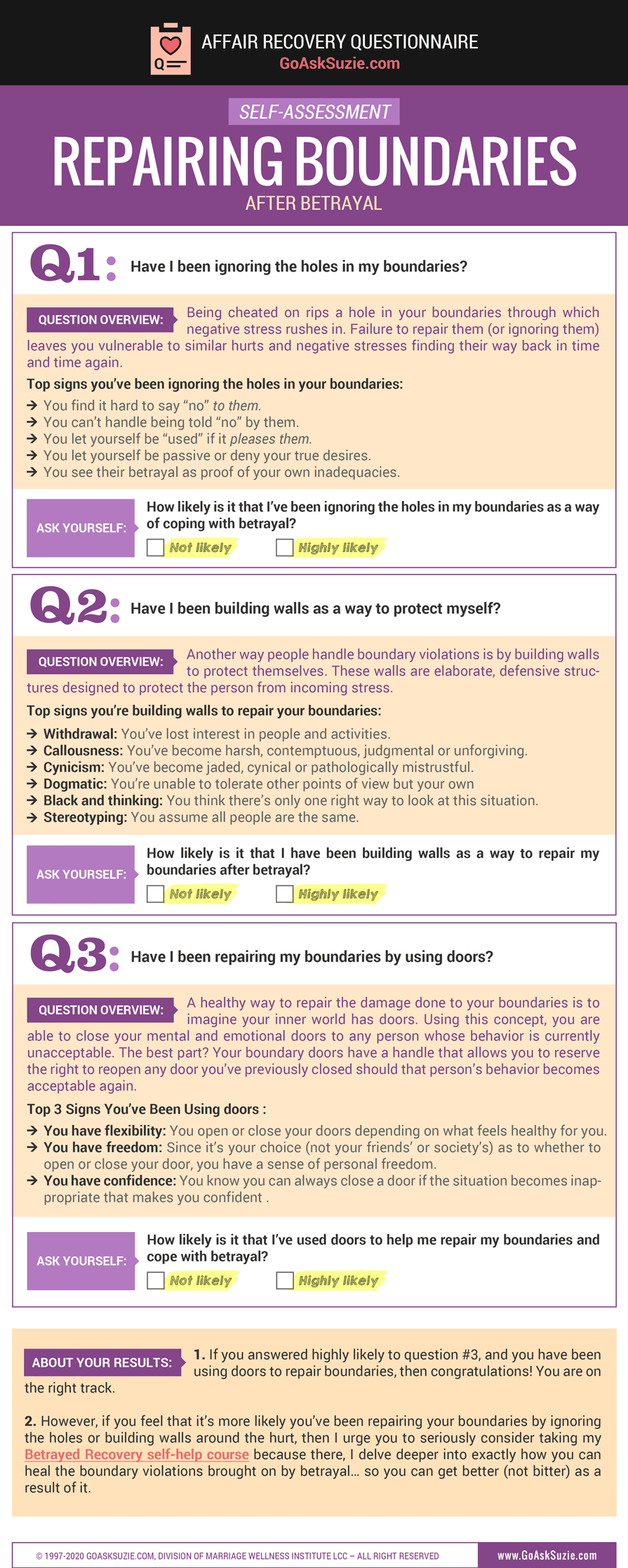Is It True, Once A Cheater Always A Cheater?
![]() Dear Suzie, I want to forgive my husband, but everyone is telling me, “once a cheater, always a cheater.”
Dear Suzie, I want to forgive my husband, but everyone is telling me, “once a cheater, always a cheater.”
Is it true that once a man cheats on you, he will always cheat on you?
![]() Did you know?
Did you know?
Back in 2007, the Discovery Channel’s MythBusters set out to test the cliché waving a red flag in front of a bull. They wanted to know if it was true that bulls charge when they see the color red.
Do you know what they discovered?
The cliché is a lie. Because bulls, like other cattle, are actually blind to the color red. So, it’s not the color they charge but the motion of the bullfighter waving the flag.
So, why do matadors use the color red? The reason is both gruesome and practical: the color red was chosen to help mask the splatters of the animal’s blood.
It makes you wonder, doesn’t it?
What other clichés are lies? Before we explore that question, I think it helps to define what a cliché really means.
Cliché: n. a phrase or opinion that is overused and betrays a lack of original thought
And now, based on that definition… is the phrase, “Once a cheater, always a cheater,” a cliché or an objective statement of truth?
And as you ponder that, there is something else you should know: Clichés and viruses have a lot more in common than you might think. Let me explain what I mean.
The Evolution of a Cliché
Have you ever heard of a “meme”?
This term was first coined by biologist and evolutionary theorist, Richard Dawkins, in 1976 as a unit of cultural information (such as a practice, idea, belief, or pattern of behavior) that’s transmitted from one person to another. Examples of memes include tunes, limericks, catchphrases, urban legends, myths, beliefs, and clichés.
Three things to know about memes:
- They self-replicate which is why they’re also referred to as mind viruses.
- Memes are especially contagious to children and the impressionable.
- Just like physical viruses, memes can either be benign or harmful.
- All clichés are memes, but not all memes are clichés (yet).
How they work:
Memes (mind viruses) are subtly designed to influence thinking and behavior. They are spread throughout a culture either vertically by cultural inheritance (from parents to children) or horizontally (by peers, media, and books).
Let’s take a closer look:
Let’s take a look at the cliché “Once a cheater, always a cheater.”
The phrase must have started with one person then was retold time and time again and ended up traveling around the world, repeated over and over again. In so doing, the cliché (meme) behaves much like a virus.
Why did this particular cliché replicate and evolve into a
persuasive cultural meme?
For the same reason that superstitions and urban legends replicate — because there’s usually some element of truth in it.

![]() I said a grain of truth. Because there are some people who are pathological cheaters. So, chances are the first person to coin that cliché did so out of the truth of their own experience. It really makes you wonder…
I said a grain of truth. Because there are some people who are pathological cheaters. So, chances are the first person to coin that cliché did so out of the truth of their own experience. It really makes you wonder…
Why did it survive so long and why has it become so contagious in our society?
My theory is this.
It has probably survived because like so many superstitions, propaganda, and conspiracy theories, this cliché is laced with fear, and that fear is what makes it so contagious. That’s because fear can be one of the most easily communicable and transferable states of mind. And once people become afraid, they lose the ability to think rationally.
FEARFUL THINKING VS RATIONAL THINKING
FEARFUL THINKING
VS
RATIONAL THINKING
Fearful thinking can be recognized by its negative expectations. To live in fear is to be in a chronic state of negative expectancy. Once a mind is infected with this kind of irrational fear, it loses its ability to evaluate reality objectively.
What is rational thinking? (critical thinking)
Rational thinking is our mind’s capacity to evaluate reality accurately. It’s the discipline to seek the truth of confirmable facts and put reason, logic, and critical thinking above wishes, fantasies, or feelings.
To think rationally, one must be able to deal honestly with reality rather than succumb to fear.
To fast-track your healing, separate the pain from the feeling of powerlessness.
So, let’s look at your situation through each of these lenses.
If you look at your husband from a state of negative expectancy, then you would assume his future will be exactly like his past.
I want you to ask yourself the following question:
Is It True?
Can you absolutely say beyond a shadow of a doubt that you know his future will be an EXACT replica of his past?
If you’re being honest (a wise choice), then the answer must be no.
You can’t know this for sure. None of us can. We can’t describe the future with any real accuracy because it hasn’t happened yet. (Fact.) Therefore, if you assume that “Once a cheater, always a cheater” is an immutable fact, then you’re choosing to deny the reality. There’s no way you can know this for sure. With that in mind, let’s take a look at your partner from a rational point of view and focus on the facts of this situation.
Just the facts, please!
- You know for a fact that he’s cheated. You know this because it’s a confirmed truth.
What else do we know for sure about what he’ll do in the future?
- Nothing. (That’s a fact.)
Anything else would basically be a psychic prediction.
Unfortunately, because it can be so painful to admit that you don’t know what’s going to happen next, most people would rather make it up or predict doom and gloom than admit that they just don’t know.
The three most feared words in the English language?
I’m convinced that the main reason that a cliché like “once a cheater always a cheater” has been so surprisingly resilient is that it helps to ward off three of the most feared words in the English language… “I don’t know.”

Am I suggesting that our fear of admitting we don’t know can be so scary that we would rather insert a cliché to cover lack of knowledge, rather than admit we don’t know?
Yes, that’s exactly what I am saying.
And what’s more…
Clichés are not the only things we’ve invented to helps us ward off the ugly truth that we just don’t know. We have another thing that helps us do that. It’s called superstition.
KNOWLEDGE VS SUPERSTITION
KNOWLEDGE
VS
SUPERSTITION
Albert Einstein once said, “Knowledge that doesn’t rest on facts is superstition.” What are superstitions? They’re placeholders for knowledge. So, if your friends are going to predict your boyfriend’s future behavior, they are doing so based on superstition… not knowledge.
Here’s another way to think about it:
If you were to take him into a court of law, would the judge convict him of a future crime? No, because that would be irrational. No court would ever convict someone for something they haven’t done yet. But if you think about it, isn’t that what your friends are doing? Aren’t they passing judgment and convicting your husband for future affairs he hasn’t even had?
Think this through with me.
Your friends seem to have arrived at the conclusion that any man who cheats (even once) is destined to become a lifetime cheater. This is the equivalent of saying anyone who gets drunk (even once) is compelled to become a lifetime drunk.
- Are there some men who are habitual liars and cheaters? Of course, there are.
- Are there some men who are habitual truth-tellers and loyal to a fault? Yes, there are!
And I can tell you (after nearly two decades of doing this work)…
- There are plenty of men who have cheated once and never offended again.
So, the real question is this:
How can you tell the difference between the serial cheater and the one-time mistake maker?
SERIAL CHEATER OR ONE-TIME MISTAKE MAKER?
(how you can tell the difference)
That’s a great question, and finding the answers requires you to be discerning… not judgmental.
BEING DISCERNING VS BEING JUDGEMENTAL
BEING DISCERNING
VS
BEING JUDGEMENTAL
It’s important to recognize these two aren’t the same. Let’s take a look at the differences.
Being judgmental creates a pecking order of you versus the rest of the world… because the act of being judgmental instantly puts you in a superior position over those whom you have judged.
Once the judgmental mind reaches a verdict, it shuts the door on any evidence to the contrary. This tells you that the judgmental mind is not open to learning.
Discernment, on the other hand, means staying open to new information and evaluating things based on current evidence. It’s important to note that being discerning doesn’t mean that you ignore evidence that points to habitual patterns of deceptive or destructive behaviors. To be discerning, one must be aware and alert to changes in the environment.
 1st Key Insight
1st Key Insight
The Judgmental Mind is Closed to Learning While the Discerning Mind Stays Open.
Therefore, judgments are the end of knowledge, not the beginning. Once you’ve passed a judgment based on a stereotype like once a cheater, always a cheater or all cats look the same (you can’t tell a cheetah from a house cat), this means you won’t be able to discern the differences between those men who are redeemable from those who are pathological.
 2nd Key Insight
2nd Key Insight
The Ability to be Discerning, Rather Than Judgmental, Is One of the Secrets to Making Wise Choices.
Unfortunately, it appears that your friends seem to have fallen into the judgmental category. But that doesn’t mean that YOU have to, so long as you understand how to maintain healthy boundaries. Those secrets are coming up next. Let’s go over a few ways to help maintain healthy boundaries.
Healthy Boundaries: #1 Secret to Making Good Decisions
What are boundaries?
Boundaries are the line in the sand that distinguishes you from someone else. They define who you are and who you’re not. They set the limits of what you’re comfortable with and what you’re not. They tell you what you’re responsible for and what you’re not responsible for in life.
How Betrayal Impacts Your Boundaries
Another way to understand the function of boundaries is to think of them like the borders of a country. Just like the borders of a country protect its citizens, the primary function of your boundaries is to protect you from unwanted stress. Getting betrayed or lied to is a violation of your personal boundaries. There are basically three ways to deal with this
The 3 Ways to Deal with Boundaries Violation:
- Ignoring the holes
- Building walls
- Using doors
Let me ask you this: At a glance, which you do think have you been doing? In other words, have you been ignoring the holes caused by his betrayal? Have you been putting up walls, or have you been creating doors to deal with having had your boundaries violated? If you’re not sure, then I invite you to do the following exercise with me.
Coming up next…
I’m going to go over all three approaches using my mini repairing boundaries questionnaire.
Your job: Is to evaluate yourself on how likely you’ve been using that approach to deal with the boundary violations brought on by betrayal. I will tell you what to do with your results after we go over all three.
Ready? Let’s get to it.
Repairing Boundaries After Betrayal
Here’s the thing…
When you know how to effectively deal with boundary violations and how to repair the holes left behind by negative experiences, you won’t have to fear what others may do or how they may act, and you’ll no longer need to put up a wall that locks out anyone from your life… for life. You can simply close the doors of your inner world when people are behaving destructively towards you. And if that behavior changes, you reserve the right to open it once again. And what if you should open the doors to that person and their behavior goes back to being destructive? You got it. You can simply close it again. It’s really as easy and effective as that.
PUTTING IT ALL TOGETHER

Well, there you have it. My answer to the “once a cheater always a cheater question. And by now, it should be clear to you that I don’t recommend stereotyping anyone based on clichés, and why I am of the school of thought that it’s better to put your faith in the man rather than a cliché.
With that in mind, let’s recap what else you’ve learned so far.
- You’ve learned how to tell the difference between fear versus rational thinking (and which is better for you).
- You’ve explored the differences between being judgmental and being discerning (and which one makes you happy).
- You’ve evaluated your boundary repair skills (and how doors help them).
Now, that leaves us with one final question.
What do you think? Because so far, you’ve shared with me what your friends think, and I have shared with you what I think, but neither is as important as what you think.
Your thoughts are the only thoughts that truly matter.
And as you think about that, think about this.
- All human beings are capable of change. If this weren’t true, we wouldn’t have made it to the top of the evolutionary chain. It’s our ability to change, adapt, and grow that has kept us going. Therefore, we have no right to set another person’s learning limits.
- No one lacks the ability — only the knowledge. All problems are caused in some way by incorrect thinking; therefore, problems can’t be solved except by correct thinking. Nobody continues to do something once they realize it’s taking them towards a result that will frustrate them and cause them pain. (Nobody does that.)
- As long as a person is alive… all that’s possible for them hasn’t yet been accomplished. It would be unwise (not to say arrogant) to write anyone off as being impossible to change. Who are we to say what’s truly possible for another human being?

“A cliché can tell you what to think, but it can’t tell you how to think. Superstition can tell you what to fear, but not whom to trust.”
And therein lies the challenge.
At some point, you must evaluate the evidence, and you must arrive at your own conclusions. This requires you to make the effort to think clearly and rationally, rather than rely on stereotypes, memes, clichés, superstitions, and other people’s opinions (including my own).
I have faith that I’ve given you some pointers that will lead you to your own conclusions. And if a time should come when you feel you’re ready to do more than just read about how to trust, heal and repair your boundaries after betrayal… then here’s what I recommend.
Enroll in my Betrayed Recovery Masterclass coaching collection. ( learn about the course here )
When you take this course, you take a major step towards healing and happiness again. Because part of what I’ve discovered is that many people who cling to clichés or live in fear and suspicion after betrayal only do so because they haven’t yet been taught how to truly heal and find happiness again. (That’s the bad news.)
The good news? Taking my Betrayed Recovery course puts you on the road to finding your happy self again. But of course, you don’t just have to take my word for it. You can click here to learn more about the course and decide for yourself if it’s a good fit for you and your particular situation.
I believe you’ll be happy you did.
Until we speak again…
Remember… Love Wins!




































